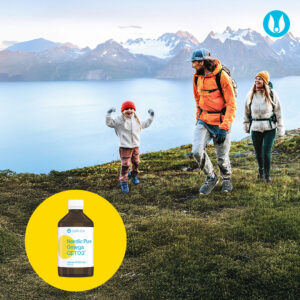The pleasant summer weather left us here a long time ago, cold winds are already blowing. As the weather becomes more severe, colds, colds and other viral diseases appear. It’s important to dress in layers and pay attention, but more importantly: prevention.
Why is the immune system more sensitive to cold?
At the end of the year, there are more tasks both at work and in the family, there is greater physical and mental stress, which can also weaken the body, making it more exposed to various bacteria and viruses.
Did you know that in the summer we only have about a 25% chance of catching a cold, but during severe weather conditions the chance of catching a cold increases to over 50%. Why does every third person cough and sneeze when the cold comes? An explanation is in the air.
In winter, the air is clean, it is pleasant to breathe delicate, although slightly tart, cool air, but at the same time full of pathogens. This is because the sun’s UV radiation, which keeps them at bay in the summer, has decreased. Thanks to this, each cold day is another test for our body.
Vitamin C – properties
Vitamin C is a water-soluble nutrient that performs important functions in the body, such as activating antioxidant processes or supporting iron absorption. Vitamin C contributes to the maintenance of healthy blood vessels, bones, teeth, gums, skin and heart, and improves the ability of white blood cells to kill bacteria and viruses. An adequate level of vitamin C is necessary for the proper functioning of the immune system and for the formation of collagen, one of the important building blocks of arteries, and at the same time reduces inflammation of the arteries. A recently published study reports that the risk of heart disease is lower the higher the level of vitamin C in the blood. This result confirms our over 50 years of knowledge that vitamin C plays an important role in maintaining cardiovascular health. According to another study, high levels of vitamin C in blood plasma reduce the risk of stroke by 50%.
In the 15th and 16th centuries, a disease called scurvy was responsible for the mass deaths of sailors. British naval surgeon James Lind selected 12 men from aboard one ship, all suffering from scurvy. He divided them into 6 pairs and gave each pair a different fruit for their daily diet. Those who received citrus fruits experienced remarkable recovery. We now know that this disease develops in the case of long-term vitamin C deficiency.
Several people tried to isolate vitamin C, but Albert Szent-Györgyi was the first to succeed by accident. At the beginning, he did not attach much importance to vitamins, he considered them uninteresting, “vitamin” means to eat, and only cooks should deal with food-related matters. Nevertheless, in 1928, while working in the laboratory of Frederick Hopkins, Szent-Györgyi isolated a sugar-like molecule from the adrenal glands and citrus fruits, and over the next several years campaigned across Europe with vitamin C, claiming that it could be considered an effective preventive or curative drug. colds and other diseases. His work was recognized in 1937 with the Nobel Prize in Medicine or Physiology.
Support your body with vitamin C and bioflavonoids!
Flavonoids play important roles in plant physiology, including pigmentation, flavor, growth, reproduction, protection against pathogens and UV radiation. Since they are phytochemicals, humans or animals cannot synthesize them, but if they eat plants, they are also very useful to them, primarily due to their anti-inflammatory and antioxidant effects.
Consuming bioflavonoids can be of great importance even in childhood. They support the optimal functioning of the child’s immune system and support the use of vitamin C. Thanks to their antiviral and antibacterial properties, they have an effective preventive effect, especially from the point of view of children going to the community. Its anti-allergic effect is also important from childhood throughout life.
Their consumption is also useful for young people who often eat unhealthy foods from fast food restaurants, as flavonoids lower triglyceride and LDL cholesterol levels while increasing HDL cholesterol levels, thus contributing to the high cholesterol levels that often develop. at a young age. Even at a young age, varicose veins are a common problem. Because flavonoid molecules are able to reduce the permeability of the damaged vessel wall, stabilizing the vessel wall and thus significantly reducing its susceptibility, thus alleviating the symptoms of e.g. varicose veins.
With age, hypertension and atherosclerosis become more and more common. We now know that flavonoids have a proven positive effect on the cardiovascular system by lowering cholesterol levels and thus reducing the risk of atherosclerosis. Flavonoids increase the stability of the lining of blood vessels and may reduce its stiffness. They inhibit the adhesion and precipitation of platelets and limit the formation of blood clots. They also help prevent long-term complications of diabetes. Due to their anti-inflammatory and antioxidant properties, they have many positive physiological effects, which is why they are recommended to be consumed throughout life.
Calivita products with vitamin C and bioflavonoids
Bioflavonoids and other compounds found in food, fresh fruits and vegetables that facilitate the absorption of vitamin C, are the so-called By forming a C complex, they are truly healthy. However, the amount of vitamins needed to fight diseases is not always covered by our daily diet, especially in winter. A healthy diet can provide the body with several hundred mg of vitamin C per day. An extremely strict diet can already provide much more – 2000 – 3000 mg – of vitamin C per day, but this diet is not acceptable or sustainable for most people in the long term, so an alternative may be carefully selected dietary supplements.




